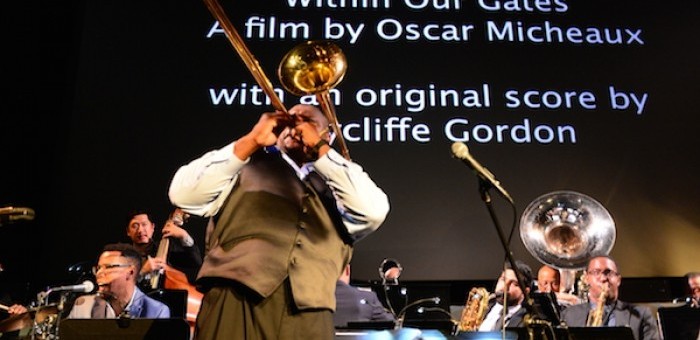Jan 13, 2026 2:09 PM
More Trump-Kennedy Center Cancellations
The fallout from the renaming of the John F. Kennedy Center for the Performing Arts to include President Donald…

Trombonist Wycliffe Gordon (center) leads a 19-piece ensemble through his modern score to the 1920 silent film Within Our Gates in Savannah, Georgia, on April 1.
(Photo: Frank Stewart)Wycliffe Gordon feels right at home in Savannah. The Georgia-born trombonist has performed at the Savannah Music Festival annually since 2003.
This time around, he presented the second performance of his score for the 1920 silent film Within Our Gates, directed by Oscar Micheaux. This is the oldest known surviving film by an African-American director—a single copy was rescued in Spain during the 1970s.
On April 1, Gordon conducted a 19-piece ensemble at the Lucas Theatre, a stylish edifice that was one of the festival’s main venues (its construction began the same year Within Our Gates was released). The musicians were arranged beneath the screen, but not in the orchestra pit. This made them visible in the low light, but their presence did not distract from the action on the screen.
Gordon came up with the winning concept of playing an introductory number prior to the screening, loosening up the crowd with a bout of bluesy gospel featuring singers Milton Suggs and Brianna Thomas. The band also featured the talents of Adrian Cunningham (reeds), Corey Wilcox (trombone), Terell Stafford (trumpet), Etienne Charles (trumpet) and Aaron Diehl (piano), among others.
Gordon doesn’t particularly set out to imitate the music of the 1920s, but his score is still infused with an old-time feel, even if the retro content does occasionally get pumped up by a modernized funk.
Gordon treads a careful boundary, teetering on the edge of keeping the music in the background while still commenting on the cinematic elements. Occasionally, though, the music would creep up to a readily noticeable level, particularly during the more dramatic sequences.
The bandleader also bends the rules by having his vocalists play with lines that spring from the plot, underlining the action. This is a highly successful strategy. Gordon constantly goaded his players into greater expression, encouraging slurs, blasts and other forms of considered luminosity.
Gordon had his band swaying and rolling into a churchy informality, his own blustery solos not least among the powerhouse emissions. As the movie finished, he led the ensemble through a concluding number, continuing the bookending approach that had opened the presentation.
It didn’t take Gordon and crew long to traverse a few geographic squares (Savannah enjoys a mathematical array of lush, tree-filled squares) to get to the Charles H. Morris Center, another core festival venue. The trombonist was set to lead his traditional late-night jam session, initially fronting his own quintet.
The material chosen was emphatically classic, but often alighting on unusual selections, such as Duke Ellington’s “Pie Eye’s Blues,” featuring Cunningham on alto saxophone crying out with sustained, skewed calls.
Gordon soloed on his soprano trombone during “Bourbon Street Parade,” then was joined by Stafford for “Honeysuckle Rose.” (The trumpeter stepped forward for his own showcase on “Skylark.”)
Suggs sang “Moanin’,” coupled with more unfettered soloing from Cunningham, and Wilcox impressed amongst Gordon’s trombone posse, a superb technician with gut feeling.
When pianist Marcus Roberts arrived to play the blues, his crisp phrases possessed a compelling clarity.
By way of complete contrast, the next day found veteran bluesman Charlie Musselwhite on the outdoor stage of the Ships Of The Sea Maritime Museum, his set illuminated by the sun sinking below the horizon behind him.
A rowdy, party vibe pervaded, fueled by the festival’s specially brewed Rollin’ & Tumblin’ IPA beer. This singer and harmonica player’s best song was “Stranger In A Strange Land,” an interminably trucking reflection on Musselwhite’s early days, being a new kid in Chicago.
He delivered such lines as “She’s my kind of gal/ She’s hot, she’s hot, she’s hot” as sheer blues poetry, rendered in an easy drawl.
Sadly, unlike most performers, Musselwhite duplicated his second set almost exactly, even down to the between-song patter. And when guitarist Luther and percussionist Cody Dickinson of the North Mississippi All-Stars joined for a number (the latter on washboard), Musselwhite offered advice for the future: “You better hit the highway, but don’t let the highway hit you back!” DB

Belá Fleck during an interview with Fredrika Whitfield on CNN.
Jan 13, 2026 2:09 PM
The fallout from the renaming of the John F. Kennedy Center for the Performing Arts to include President Donald…

Peplowski first came to prominence in legacy swing bands, including the final iteration of the Benny Goodman Orchestra, before beginning a solo career in the late 1980s.
Feb 3, 2026 12:10 AM
Ken Peplowski, a clarinetist and tenor saxophonist who straddled the worlds of traditional and modern jazz, died Feb. 2…

The success of Oregon’s first album, 1971’s Music Of Another Present Era, allowed Towner to establish a solo career.
Jan 19, 2026 5:02 PM
Ralph Towner, a guitarist and composer who blended multiple genres, including jazz — and throughout them all remained…

Rico’s Anti-Microbial Instrument Swab
Jan 19, 2026 2:48 PM
With this year’s NAMM Show right around the corner, we can look forward to plenty of new and innovative instruments…

Richie Beirach was particularly renowned for his approach to chromatic harmony, which he used to improvise reharmonizations of originals and standards.
Jan 27, 2026 11:19 AM
Richie Beirach, a pianist and composer who channeled a knowledge of modern classical music into his jazz practice,…